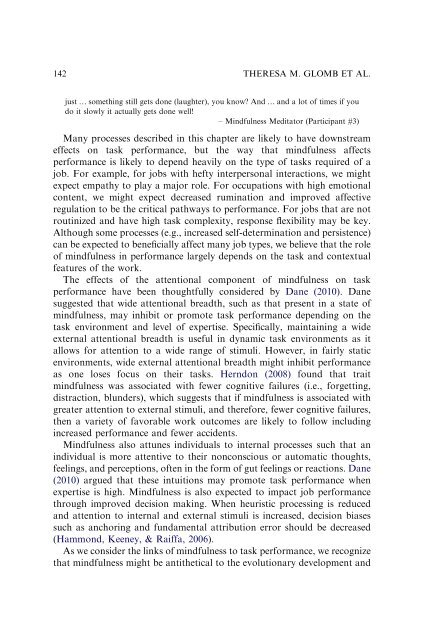Mindfulness at work (Glomb, Duffy et al, 2012) - Human Resources
Mindfulness at work (Glomb, Duffy et al, 2012) - Human Resources
Mindfulness at work (Glomb, Duffy et al, 2012) - Human Resources
You also want an ePaper? Increase the reach of your titles
YUMPU automatically turns print PDFs into web optimized ePapers that Google loves.
142THERESA M. GLOMB ET AL.just y som<strong>et</strong>hing still g<strong>et</strong>s done (laughter), you know? And y and a lot of times if youdo it slowly it actu<strong>al</strong>ly g<strong>et</strong>s done well!– <strong>Mindfulness</strong> Medit<strong>at</strong>or (Participant #3)Many processes described in this chapter are likely to have downstreameffects on task performance, but the way th<strong>at</strong> mindfulness affectsperformance is likely to depend heavily on the type of tasks required of ajob. For example, for jobs with hefty interperson<strong>al</strong> interactions, we mightexpect emp<strong>at</strong>hy to play a major role. For occup<strong>at</strong>ions with high emotion<strong>al</strong>content, we might expect decreased rumin<strong>at</strong>ion and improved affectiveregul<strong>at</strong>ion to be the critic<strong>al</strong> p<strong>at</strong>hways to performance. For jobs th<strong>at</strong> are notroutinized and have high task complexity, response flexibility may be key.Although some processes (e.g., increased self-d<strong>et</strong>ermin<strong>at</strong>ion and persistence)can be expected to benefici<strong>al</strong>ly affect many job types, we believe th<strong>at</strong> the roleof mindfulness in performance largely depends on the task and contextu<strong>al</strong>fe<strong>at</strong>ures of the <strong>work</strong>.The effects of the <strong>at</strong>tention<strong>al</strong> component of mindfulness on taskperformance have been thoughtfully considered by Dane (2010). Danesuggested th<strong>at</strong> wide <strong>at</strong>tention<strong>al</strong> breadth, such as th<strong>at</strong> present in a st<strong>at</strong>e ofmindfulness, may inhibit or promote task performance depending on th<strong>et</strong>ask environment and level of expertise. Specific<strong>al</strong>ly, maintaining a wideextern<strong>al</strong> <strong>at</strong>tention<strong>al</strong> breadth is useful in dynamic task environments as it<strong>al</strong>lows for <strong>at</strong>tention to a wide range of stimuli. However, in fairly st<strong>at</strong>icenvironments, wide extern<strong>al</strong> <strong>at</strong>tention<strong>al</strong> breadth might inhibit performanceas one loses focus on their tasks. Herndon (2008) found th<strong>at</strong> traitmindfulness was associ<strong>at</strong>ed with fewer cognitive failures (i.e., forg<strong>et</strong>ting,distraction, blunders), which suggests th<strong>at</strong> if mindfulness is associ<strong>at</strong>ed withgre<strong>at</strong>er <strong>at</strong>tention to extern<strong>al</strong> stimuli, and therefore, fewer cognitive failures,then a vari<strong>et</strong>y of favorable <strong>work</strong> outcomes are likely to follow includingincreased performance and fewer accidents.<strong>Mindfulness</strong> <strong>al</strong>so <strong>at</strong>tunes individu<strong>al</strong>s to intern<strong>al</strong> processes such th<strong>at</strong> anindividu<strong>al</strong> is more <strong>at</strong>tentive to their nonconscious or autom<strong>at</strong>ic thoughts,feelings, and perceptions, often in the form of gut feelings or reactions. Dane(2010) argued th<strong>at</strong> these intuitions may promote task performance whenexpertise is high. <strong>Mindfulness</strong> is <strong>al</strong>so expected to impact job performanc<strong>et</strong>hrough improved decision making. When heuristic processing is reducedand <strong>at</strong>tention to intern<strong>al</strong> and extern<strong>al</strong> stimuli is increased, decision biasessuch as anchoring and fundament<strong>al</strong> <strong>at</strong>tribution error should be decreased(Hammond, Keeney, & Raiffa, 2006).As we consider the links of mindfulness to task performance, we recogniz<strong>et</strong>h<strong>at</strong> mindfulness might be antith<strong>et</strong>ic<strong>al</strong> to the evolutionary development and


